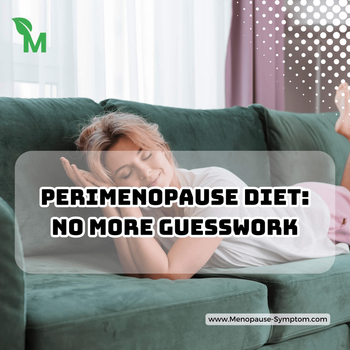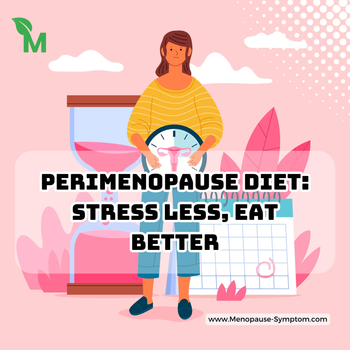This stage leads to a decrease in the hormone estrogen, which can cause weight gain and insomnia and make weight management more difficult. However, building a reasonable diet can not only help women maintain their weight but also minimize the symptoms associated with perimenopause and menopause.
Understanding Perimenopause
Before going into the details of the diet, it is important to understand perimenopause. This is the stage that occurs before official menopause, usually starting between the ages of 40 and 50. During this time, many women experience symptoms such as hot flashes, insomnia, and difficulty maintaining weight. Having a balanced and healthy diet is extremely important to support the body.
Benefits of a Healthy Diet
A healthy diet during perimenopause helps replenish essential nutrients, reduce harmful or disruptive substances in the body, strengthen health, improve mood, and help maintain energy. Research has shown that a good diet can reduce the risk of cardiovascular disease and osteoporosis - two serious health problems that women often face after menopause.
Principles for a perimenopause diet
Increase calcium and vitamin D-rich foods: Perimenopausal women need to supplement calcium to avoid osteoporosis. Milk, yogurt, nuts, and salmon are excellent sources of calcium. Vitamin D is also important for calcium absorption. Sunlight , foods such as mushrooms, fish, and egg yolks are rich sources. Avoid foods that are too high in yeast.
· Minimize sugar and starch: When hormones change, the body can become more sensitive to insulin. Minimizing sugar and starch consumption helps maintain weight and reduces the risk of diabetes. Instead, choose whole grains such as quinoa, brown rice, and oats.
· Choose quality proteins: Protein is essential for maintaining muscle mass. During perimenopause, women can choose protein sources such as fish, poultry, beans, and nuts to maintain health.
· Add fiber: Fiber not only helps maintain a feeling of fullness but also aids digestion. Green vegetables, tubers such as broccoli, carrots, artichokes, fruits such as avocados, pears, strawberries, apples, and whole grains are all rich sources of fiber.
· Healthy drinks: Replace sugary drinks with water, green tea, herbal tea, or natural fruit and vegetable juices, without adding sugar. Green tea contains powerful antioxidants, which can support metabolism.
Some dishes suitable for premenopausal women
· Vegetable salad mixed with seeds: Combining salad with seeds helps provide fiber, vitamins and essential minerals. You can add milk to this combination, not only delicious but also nutritious.
· Green smoothie: By blending vegetables and fruits with ice and milk , you will have a nutritious and cool drink, which helps reduce body heat and also provides many vitamins for your body. For example, a drink made from spinach, bananas, and nut milk helps provide enough energy for you without storing excess fat.
· Grilled salmon with vegetables: Not only rich in protein but also contains omega-3, supporting cardiovascular health.
· Breakfast oatmeal: This is a great choice, helping women feel full for a long time and providing enough energy for a long day.
Exercises to support perimenopause
In addition to diet, exercise is also an important factor. Regular exercise not only helps improve physical health, control weight but also reduces symptoms such as stress or anxiety. Some suitable exercises include:
· Yoga: Not only does it help the body stay flexible, yoga also creates a feeling of relaxation, reducing anxiety.
· Walking: One of the simple and effective ways to stay in shape and improve cardiovascular health.
· Light weight training: Helps maintain muscle mass, which is especially important during perimenopause and menopause.
Facing with Perimenopause and Menopause Symptoms
Going through perimenopause is uncomfortable, and many women find it difficult to cope with these changes. Therefore, finding the right treatment for your symptoms is important. In addition to a healthy diet and regular exercise, natural therapies such as essential oils or acupuncture can also help relieve symptoms. You should consult a health professional to get support for these methods.
Advice from the experts
Nutritionists recommend that monthly health checks and regular consultations with doctors are necessary during perimenopause, so that you can adjust your diet and exercise accordingly. You can find support from the community, from people who have gone through this stage, share and ask for tips that they have used. Doing this will give you enough information to feel more confident and comfortable.
Conclusion
Perimenopause is a natural part of every woman's life. Instead of seeing this as a difficult phase, take advantage of this opportunity to make positive lifestyle changes. Building and maintaining a reasonable diet not only helps to lose weight sustainably but also improves overall health during menopause. By investing in your health during perimenopause, every woman can confidently step into the following years with the best health and mood. Start today to have a healthy and energetic life!
Source: Team MPS compiled, analyzed and wrote. Please dont reup without source. Many thanks.

Perimenopause Diet: No More Guesswork
09.02.2024
Perimenopause is a natural process in every woman's life, usually starting in her 40s and lasting until menopause.

Perimenopause Diet: Stress Less, Eat Better
09.02.2024
Perimenopause is a stage that many women face before officially entering menopause. This is a time that marks major changes in the body, including hormonal imbalances and uncomfortable symptoms.

Don't Ignore These Unusual Perimenopause Symptoms
Invalid Date
